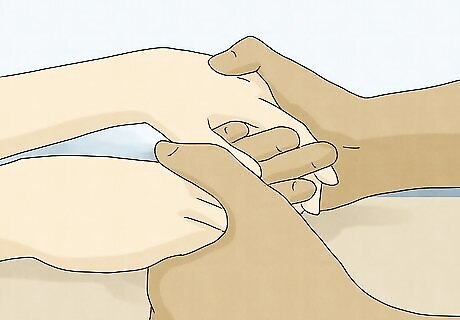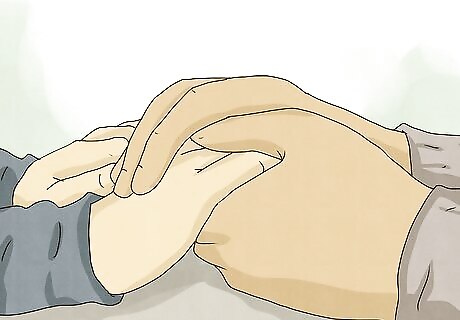
views
Sharing Your Love With the World

Serve others. Learning to give your time and energy in service to a just cause does not only create a better world, it also provides great personal satisfaction and helps you be more loving. Identify a cause you believe in and locate a related volunteer organization in your area. For instance, if you’re passionate about animal rights and environmentalism, you could volunteer with your local animal shelter or conservation group.

Reflect on your personal mistakes. Taking time to consider occasions in which you acted out of spite, hate, or anger. Thinking about these failures, both big and small, and recognizing that you were in the wrong, will lead you to act in a better, more loving way in the future. While you should not hold on to or obsess over your mistakes, it is important to reflect on them to discover how you can respond in more loving ways in the future. For instance, if you got angry at a coworker and yelled at him, think the situation over to find out both how you can make it right and how you can avoid repeating the same mistake next time. Perhaps you’ll conclude that when you feel angry, instead of responding immediately, it’s best if you take five minutes to practice deep breathing exercises and calm down before confronting someone who frustrates you.

Surround yourself with people who are loving. Love is infectious. When you are around people who are full of love for you, themselves, and others, you will have a hard time not becoming more loving yourself. Find friends who support you and minimize the time you spend with negative, spiteful individuals.

Practice forgiveness. Even if someone blatantly disrespects and dislikes you, you should be prepared to forgive them. To be more loving, you must let go of hate and anger. This applies not only to others, but to yourself, as well. Don’t hold on to your failures. Learn from them, then let them go. Picture your negative memories and thoughts as little red balloons. In your mind’s eye, imagine you’re letting them go and watching them float up into space until they are out of sight. Reader Poll: We asked 605 wikiHow readers what’s the biggest challenge they face in forgiving themselves, and 65% said letting go of guilt that they hurt someone. [Take Poll]

Write down positive experiences. At the end of each day, write down the best things that happened during the day in a journal. Writing down information makes you more likely to retain it, so by writing down positive experiences, you’ll be able to act in a more loving way. For instance, you might write, “My friend Abu is so kind. I am thankful to have a friend like him.” Actively making a note about your appreciation for your friends, family, and coworkers -- as well as nonhuman good things like animals, the sun, and earth -- can help you become more loving.
Understanding Love

Let go of fantasy love. This version of love is less focused on actions and more focused on an intangible feeling. While love does have an important emotional aspect, love is also about acting in a loving way. By recognizing that loving actions are an essential ingredient to real love, you can begin to let go of the notion that love exists only or primarily as a feeling. The fantasy of love dictates that when people love each other, they never fight or say anything hurtful. Letting go of this fantasy will also help you realize that even though you love your partner, they are not perfect. This realization will allow deeper intimacy as you begin to see your actual, not idealized, partner.

Evaluate your your actions. One of the big obstacles to becoming more loving is believing that you are already loving someone at an adequate level. However, your actions tell you a lot about what you really feel and think. Think about the way you act in order to discover if you are acting in a loving way. Even if you believe, “I am a good partner and give lots of love to my partner,” upon reflection you might reconsider this belief. For instance, do you respect your partner’s wants and needs? Do you show him or her affection? Do you say kind things that encourage them to become the best person they can be? Carefully reflect upon your behavior to discern whether or not you could be more loving. In order to avoid biasing the evaluation in your favor, ask for input from your partner. Ask him or her, “Does my behavior demonstrate that I love you?” Use their feedback when considering your actions.

Don’t expect anything in return. If you do something nice for your partner or someone else, don’t hold it against them by expecting them to do something nice for you in return. To be more loving, give without any thought of reward for yourself. Love should not involve keeping score on either conflicts and negative interactions, or on good things, gift-giving, and positive interactions. If you love someone, share with them all that you can within reason. However, don’t let yourself be taken advantage of. Ensure your needs are met, as well as your partner’s.
Working On You

Be more hopeful. Everyone struggles with self-doubt and internal criticism. Perhaps you hear a small, critical voice attacking you or your partner. “She/He is a loser. You can do better,” or “This relationship will not work out. Being honest with her/him will only lead to disappointment” are examples of the kinds of lies we’ve internalized due to bad experiences in the past or critical parents or family members. Letting go of this baggage can help you become more loving. Don’t listen to internal negative advice, even when it seems convincing. When you find you’re doubting yourself, counter these thoughts with positive, constructive thoughts like, “I have value and am not afraid to love my partner more.” Voice therapy -- the process of saying these negative beliefs and criticisms out loud, then answering them with your real opinion -- can help give you more hope. By taking a chance with someone and opening up to them, you might end up getting hurt emotionally, but you might also inspire them to be more honest and open with you, thus deepening your relationship. Take comfort in the fact that anyone who uses your honesty and vulnerability to criticize or disparage you does not love you, and you should feel good about leaving them out of your life.

Grow as a person. If you are unhappy with yourself, you will have difficulty loving others. Many people spend their lives trying to find the right partner and wondering why they cannot find someone they really love. Start by identifying your own values and what you enjoy doing, and then live your life in alignment with these things. By engaging in activities you enjoy, it will be easier for you to be more loving towards other people. Get an education. Learning more can deepen your understanding of yourself and your place in the world. While you could go to college, a good place to start is the public library. Check out books on a variety of topics, splitting your time equally between fiction and nonfiction. Gain fulfilling employment. When you are engaged in work you feel proud of, you’ll have many opportunities to build your own sense of self-worth as you rack up accomplishments at work.

Accept yourself. Be honest about your likes and dislikes. Don’t pretend to like football, for instance, just to impress your family or friends. Know who you are and be honest about it with yourself, then share who you really are with others. If you have flaws, be conscious of them and try to improve yourself. Do not compare yourself with others. Instead, compare yourself only with your past self, and aim always for progress, rather than perfection.

Accept your feelings. If you feel angry, hurt, or sad, be honest about it and tell your partner how you’re feeling. Don’t put up a front in order to pretend that something hurtful your partner said didn’t hurt you.]] At the same time, be honest about feeling positive emotions like love, admiration, or affection. No matter what you’re feeling, find positive ways to express it. If you’re feeling hurt, for instance, don’t call your partner names or throw their belongings out the sixth-story window. Instead, confront them directly and say, “I’m really upset by what you said. I think you were being unfair and I deserve an apology.”
Demonstrating You Care

Give your relationship your best shot. Holding back positive, loving emotions prevents us from loving as much as we could and should. Sometimes in order to love as well as possible, we need to step out of our comfort zones. For instance, if your partner really feels loved when you hold his or her hand when walking around town, but you think holding hands is childish, try to change this belief and behavior within yourself. Showing that you love someone in new ways can deepen the relationship and allow you to be more loving.

Stay attentive to your partner’s wants and needs. If you make the relationship all about you, it will be hard to know how to be more loving of your partner. Ask your partner each day after work or school how they’re feeling and how their day has been. Show your concern and listen to what they have to say. Ask relevant follow-up questions when they share interesting details with you.

Do little things your partner likes. Everyone has different ideas about what actions demonstrate love. Ask your partner about what kinds of behavior they consider loving. For instance, perhaps your partner thinks holding the door open for him/her is loving, or feels really loved and close to you when you give them back rubs. Instead of just assuming that fixing your partner’s computer for them will demonstrate that you love them, ask them directly about what actions they consider loving.

Use pet names with your partner. Many couples like to call each other “honey,” “sweetie,” or some equally cute term of endearment. You could even use an inside joke to give your partner a silly pet name that only they will understand.

Support your partner. Showing support to your partner is obvious and important during times of crisis, such as when his or her parents pass away, or when they crash their car. However, you can also be more loving toward your partner by demonstrating some simple everyday forms of support. When you partner wants to try a new sport, for instance, you should not make fun of them or criticize their effort to expand their horizons. That would not be a loving act. Instead, encourage them to pursue their interests as long as they remain, safe, healthy, and happy. You can also offer emotional support your partner when your partner is having a bad day. Sometimes, showing you support your partner is as simple as listening to what they have to say and telling them you’re concerned about their plight.
Communicating in a Loving Way

Avoid accusatory language. When expressing yourself to your partner, avoid “you” statements, as in “You never listen to me.” Instead, focus the conversation on your feelings, thoughts, and ideas. Use “I” statements, as in, “I wish we could find a way to talk more honestly with each other.” Communicating with “I” instead of “you” will reduce likelihood of conflict and increase the good, loving feelings you and your partner have for one another.

Make time to talk to your partner. Everyone is busy. Finding time to communicate with your partner in a healthy, productive way can be difficult, even if you do sincerely love each other. To communicate in a more loving way, ensure that you make time for one another either at the start or end of each day (or any time in between). Sustained, structured time to simply sit down with your partner and talk about whatever you have on your minds can bring you closer together and help you become a more loving couple. Don’t talk about anything difficult when either of you are tired. Being tired means you’ll feel more stressed and impatient during the conversation.

Focus on your partner during conversations. Don’t look at your phone, computer, TV, or tablet. Instead, sit with them and stay focused on them and the conversation at hand. You could do this over dinner, in the living room, during a walk, or in some other venue. Wherever you choose to spend time talking to your partner, ensure you focus on them.

Resist the urge to win every fight. When you and your partner are arguing, sometimes both of you inadvertently escalate the argument to the point where it becomes difficult to disengage. Both of you become more and more angry, and feel the need to win. This is an unhealthy communication pattern. Becoming conscious of it and working to change it will help you become more loving. For instance, next time you and your partner are arguing, just say, “Look, I’m sorry. Let’s not argue any more.” Walking away makes you the bigger person. Don’t look at it as giving up. Letting things go takes strength and builds character. It says that you love the person you’re fighting with more than you love being right and winning. Some battles are worth fighting. Don’t compromise on your principles or let your people walk all over you. Choose wisely when you decide to fight to the end.




















Comments
0 comment